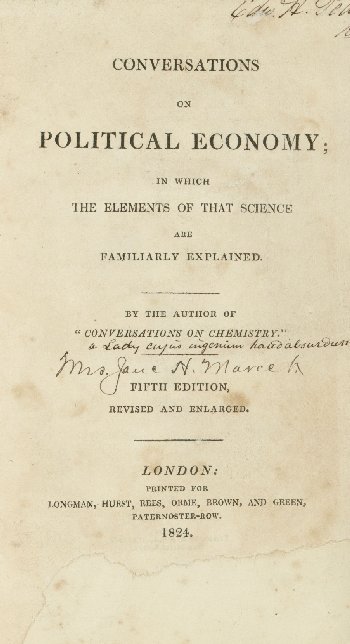Ingenium Haud Absurdum
Today, praise for a woman goes astray. The University of Houston's College of Engineering presents this series about the machines that make our civilization run, and the people whose ingenuity created them.
In recent programs I've talked about an early-19th-century writer of popular technical books. Jane Marcet used conversations between a Mrs. B and two young ladies, Caroline and Emily, to explain very complicated ideas.
The other day I found an odd note penned on the frontispiece of her political economics book. It was part Latin, part English: "a Lady cujus ingenium haud absurdum." What did it mean? A librarian with a background in classics came to my aid.
It literally means "a lady whose talent is by no means" -- what? "absurd?" "awkward?" It's hard to know what the book's owner meant by the word "absurdum." We need some context.
It turns out he'd paraphrased a line from the Roman author Sallust. Sallust tells about a woman named Sempronia.
Now among these women was Sempronia, who had often committed many crimes of masculine daring ... able to play the lyre and dance more skillfully than an honest woman ... there was nothing she held so cheap as modesty and chastity ...
Next comes a free translation of the line on the frontispiece:
She was a woman of no mean endowments.
Is this how the owner saw the author? Brilliant, iconoclastic, half-whore? Then I realize: every copy of Marcet's books I've seen -- every copy of these instructional books for young ladies -- was owned and read by a man.
Most are filled with marginal notes -- all down-to-earth and factual. Every few paragraphs the owner of this one has written a little marginal summary. He obviously takes it very seriously.
Yet this odd quote from Sallust! Then we find that none of Marcet's early books carried her name. One says, "by the author of ... " and cites another work. She didn't reveal herself as author of her book on chemistry 'til it reached its 13th edition.
Still, this owner knew a woman had written his book. He'd clearly meant to praise her. Yet he ties into early-19th-century apprehensions. Listen to Marcet's own words in an introduction:
In venturing to offer to the public ... an Introduction to Chemistry, the author, herself a woman, ... feels it ... necessary to apologize ... as she can have no real claims to the title of chemist.
Women have been telling us how they've been written out of history. Now I've stumbled into the middle of that process. Everyone's bothered by Marcet's gender. That book owner, society in general, even Marcet herself. Everyone tries to find ways to minimize the truth of Marcet's enormous educational impact.
Marcet was one of the great technical educators 170 years ago. This man sounds a warning to us all when he has to cast her as wanton -- before he can praise her for all she's done.
I'm John Lienhard, at the University of Houston, where we're interested in the way inventive minds work.
(Theme music)
Marcet, J. Conversations on Political Economy... , 5th ed. London: Longman etc., 1824.
Sallust. Sallust with an English Translation (tr. by J.C. Rolfe). The Loeb Classical Library, Cambridge, Mass.: Harvard University Press, 1921.
Alic, M., Hypatia's Heritage. Boston: Beacon Press, 1986, Chapter 12. (This gives the best overview of Marcet that I could find.)
Jones, T.P., New Conversations on Chemistry... Philadelphia: John Grigg, 1833. (This is a revised version of Marcet's original 1805 book on chemistry.)
I am most grateful to Dr. Jeff Fadell at the University of Houston Library for his fine detective work in tracking down the Latin quotation.

Image courtesy of Special Collections, UH Library